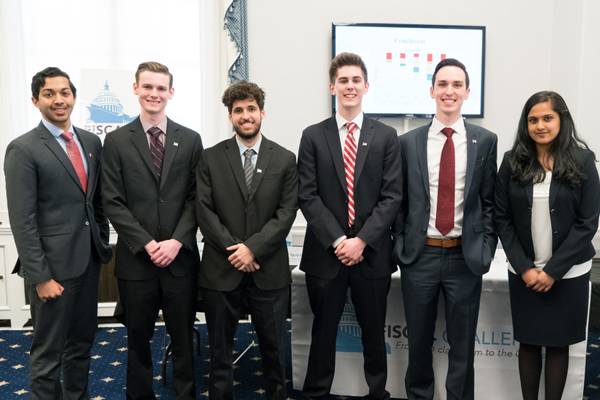Students’ economic policy proposals commended at national competition

U.S. economic policy is a political juggernaut, something with which many fiscally-minded experts continue to grapple. But one group of Northeastern students recently took U.S. fiscal preparation head on and fared rather well.
Earlier this month, a team of students in the Economics Society was named one of three finalists in the Fiscal Challenge, a national competition that charges college students with devising plans to ensure the country’s fiscal future.
This year 25 student teams were tasked with creating solutions to keep the U.S. debt-to-GDP ratio around its current level of 74 percent for the next the 25 years. After reviewing the Northeastern students’ proposal, the judges named the team a finalist in the competition along with teams from Harvard University and the University of Tübingen in Germany.
All three teams traveled to Washington, D.C., to present to a panel of expert judges and while the Harvard team won the challenge, Northeastern’s group of economists-in-training was impressive.
“The judges mentioned that our policies were something they would come up with,” said Alexander Arnst, DMSB’19. “It was to the quality they would do.”
Northeastern’s presentation focused on major policies and programs such as social security, defense, education, and infrastructure that, if reformed, would have a substantial impact on the U.S.’s debt-to-GDP ratio, such as eliminating the payroll tax cap in social security and increasing tolls for heavily used roadways to increasing funding for infrastructure.
Emily Weis, SSH’16, noted that each of the team members selected a policy or project that they were not only interested in, but would also help reach the ultimate goal. “We became experts in our own areas,” she said.
Among the feedback the Northeastern students received was that their proposal offered some of the most creative solutions among the 25 schools that competed.
“Our proposals were a lot more creative than those of the other finalists,” noted Jey Sundaram, SSH’18. “One that we really loved was abolishing the penny. We tried to give a wider variety of policies and different feasibility levels for each one.”
The experience showed Steven Siano just how much of an issue fiscal sustainability is for the U.S., especially with the Social Security disability fund going bankrupt by the end of this year. “The night before our presentation there was a Democratic presidential debate, and our presenters were offering more solutions than the candidates,” said Siano, SSH’16.





